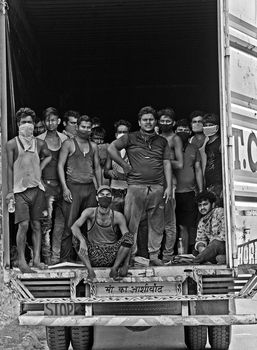While most of us binge-watched movies or web series from the comfort of our homes during the lockdown, the workers who built those homes were abandoned by their employers, far from their own homes. Not having work or cash, they suffered without food and shelter. But more than these basic needs, they yearned to be with their loved ones. When the government started trains with limited seats for migrants to return to their home states, they flocked to the stations in their thousands and struggled to fill application forms. When the trains left with some, the remaining camped outside police stations day and night, hoping to get the clearance to proceed homeward.
A few chose the path of self-reliance, taking the long walk home, carrying bags and sacks of utensils and clothes. Children sat on the shoulders of their fathers or clung to the hips of their mothers. Grown-up kids walked barefoot with their parents in the scorching summer sun. Their long journeys are filled with fear—of authorities and of road accidents. The heart-rending scenes moved a few good people to help the migrants on their way. Some gave food and water, a few offered lifts in their vehicles and others donated money.
Youngsters who used to send money home were forced to ask their families for money. They bought bicycles and peddled for thousands of kilometres. Groups of boys walked on train tracks, through forests and farm fields to evade police checkpoints on the highways. “If we all leave the city, it will come to a standstill, that is why they don’t want us to leave,” said a boy who worked as a helper at a construction site. After years in the city, he wants to return home and never come back.


